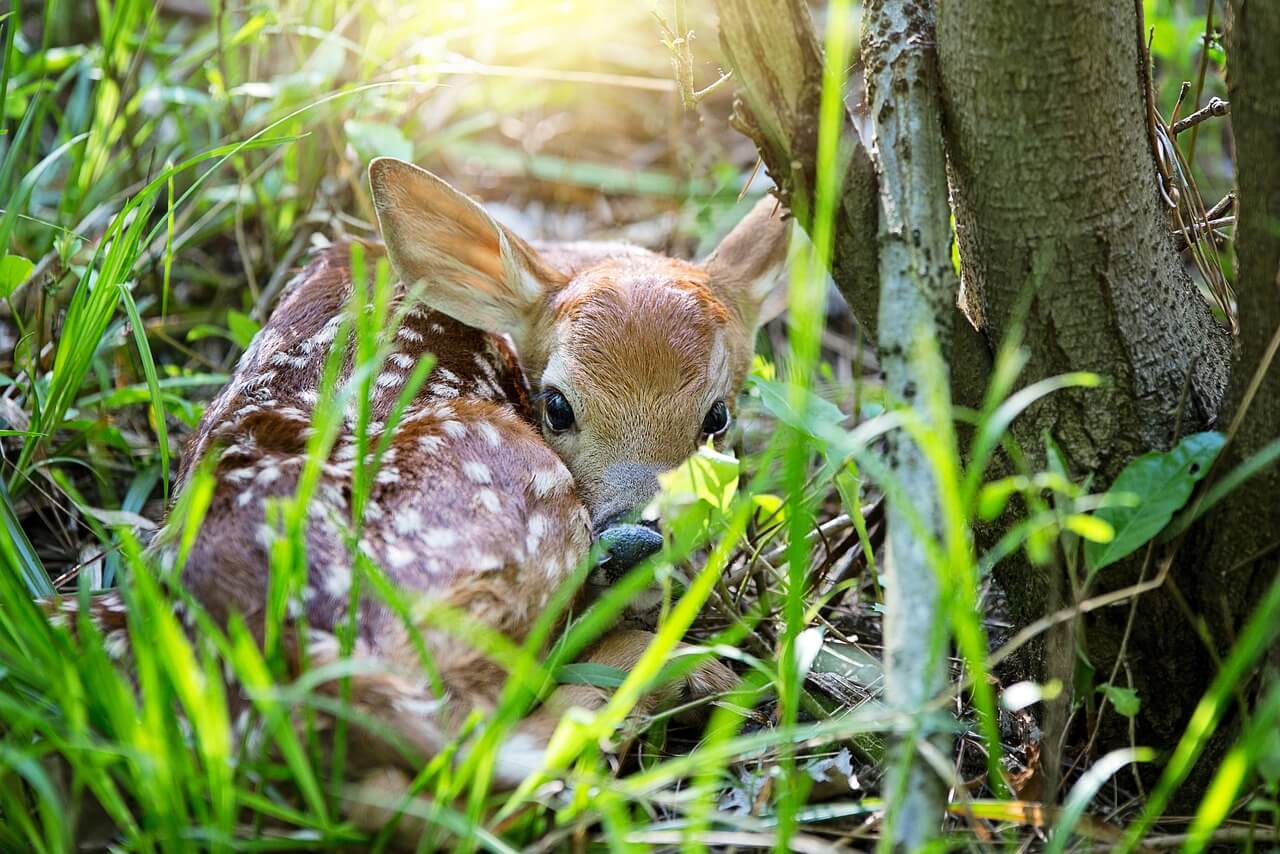Every year during the fawning season, wildlife centers are often overwhelmed by the number of calls they get about seemingly abandoned baby deer. So what to do if you find a baby deer?
The good news is that the majority of the time, they don’t need any help at all. The bad news is that far too many baby deer are handled inappropriately, severely decreasing their chance of survival. Here are some tips to keep in mind if you see a fawn on its own.
What You'll Learn Today
What To Do If a Fawn is Alone?

The short answer? Nothing! It’s perfectly normal for a mother deer (doe) to leave her baby for many hours at a time.
Deer spend much of the day foraging for food and are always on alert for predators. Fawns cannot keep up with their mothers for the first couple of weeks after birth, so they are left in a safe spot and checked on throughout the day.
Baby deer don’t leave a scent, but adults do. Does try to avoid checking on their fawns or coming back to nurse too often because they don’t want to lead any predators to their babies.
Unless a fawn is obviously injured or in distress, it’s important to leave them where they are. Do not approach or try to interact with the deer.
Here are some of the negative effects of humans interfering with baby deer in the wild:
- Handling a fawn decreases its chance of survival. The longer you and your human scent are around the fawn, the more vulnerable to predators they become.
- Deer are instinctively terrified of humans. Putting a fawn in a stressful situation by picking it up, petting it, etc., can cause physical distress which can even kill them.
- Attempting to “rescue” a baby deer on your own without contacting a licensed wildlife rehabilitator is illegal.
If you’ve already handled or moved the baby deer, put it back where you found it as soon as possible. Even with your scent on it, its mother will almost always eventually return to care for her baby.
How Long Will a Mother Deer Leave Her Baby Alone?
It’s not uncommon for a fawn to be left alone for up to 12 hours. A doe usually returns when they hear the fawn crying out. Even then, the mother will wait until the coast is clear (including from humans) before she returns.
After the mother deer checks on and feeds her baby, she’ll leave again. She keeps her visits short and often in the dark, so you likely wouldn’t even notice if it’s on your property.
How Do You Know if a Baby Deer is Abandoned?

When you stumble upon a fawn, it’s easy to assume that they are vulnerable or in danger. When deer are born, they are small, quiet, and appear weak.
Fawns are preprogrammed to be quiet and still to avoid detection in these first couple of weeks. They are simply waiting for mom to come back.
While a fawn’s mother is nearby most of the time, there are some instances in which a baby deer needs intervention. Here are some signs that the fawn needs help:
- The deer is in a dangerous spot, like close to a busy road.
- You can see clear signs of injury.
- The baby deer is calling out continuously.
- The fawn is wandering around alone.
- You can spot a dead doe nearby.
Even some of these signs may not guarantee that the fawn needs to be rescued. For example, when a baby deer cries out for its mom, it may be a while before the doe checks in. Mother deer sometimes wait 10-20 minutes after a fawn starts bleating to ensure that the area is safe.
Read also: What Does It Mean When A Deer Stares At You?
Final Words
When you notice any of the above warning signs, however, call a local wildlife rescue center as soon as you can and follow their instructions. They will determine whether the deer does need help, and will intervene if necessary.
For more information on how to help baby deer, watch the video below. Bonus: you’ll also get your cute baby animal fix for the day.
The best option is to call the local authority or zoo.
Loved this important article. Now, this former city boy can rest assured that the tiny fawn, twice found, is really in good hands.